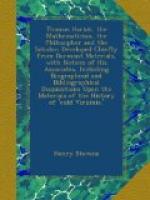Thomas Hariot was born at Oxford, or as Anthony à Wood with more than his usual quaint-ness expresses it, ’ tumbled out of his mother’s womb into the lap of the Oxonian muses in 1560.’ He was a ’ bateler or commoner of St Mary’s hall.’ He ’ took the degree of bachelor of arts in 1579, and in the latter end of that year did compleat it by determination in Schoolstreet.’ Nothing of his boyhood, or of his family, except a few hints in his will, has come to light.
It is not known precisely at what time Hariot joined Walter Raleigh, who was only eight years his senior. From what their friend Hakluyt says of them both, their intimate friendship and mutually serviceable connection were already an old story as early as 1587. On the eighth calends of March 1587, that is on the 22d of February 1588, present reckoning, Hakluyt wrote from Paris to Raleigh in London,
’ To you therefore I have freely desired to give and dedicate these my labors. For to whom could I present these Decades of the New World [of Peter Martyr] more appropriately than to yourself, who, at the expense of nearly one hundred thousand ducats, with new fleets, are showing to us of modern times new regions, leading forth a third colony [to Virginia], giving us news of the unknown, and opening up for us pathways through the inaccessible ; and whose every care, and thought, and effort tend towards this end, hinge upon and adhere to it ? To whom have been present and still are present the same ideas, desires, & incentives as with that most illustrious Charles Howard, the Second Neptune of the Ocean, and Edward Stafford our most prudent Ambassador at the Court of France, in order to accomplish great deeds by sea and land. But since by your skill in the art of navigation you clearly saw that the chief glory of an insular kingdom would obtain its greatest splendor among us by the firm support of the mathematical sciences, you have trained up and supported now a long time, with a most liberal salary, Thomas Hariot, a young man well versed in those studies, in order that you might acquire in your spare hours by his instruction a knowledge of these noble sciences ; and your own numerous Sea Captains might unite profitably theory with practice. What is to be the result shortly of this your wise and learned school, they who possess even moderate judgment can have no difficulty in guessing. This one thing I know, the one and only consideration to place before you, that first the Portuguese and afterwards the Spaniards formerly made great endeavours with no small loss, but at length succeeded through determination of mind. Hasten on then to adorn the Sparta[Vir-ginia] you have discovered; hasten on that ship more than Argonautic, of nearly a thousand tons burthen which you have at last built and finished with truly regal expenditure, to join with the rest of the fleet you have fitted out.’




